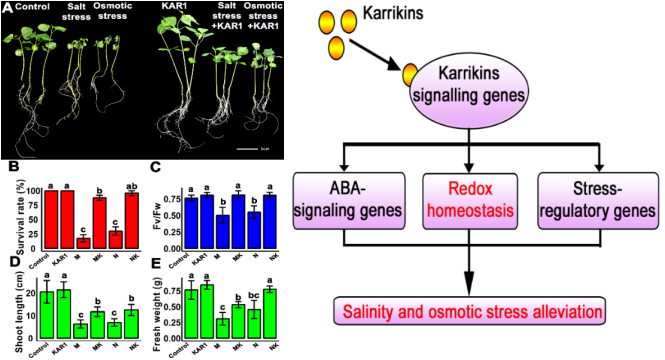
Newsroom
Chinese scientists led by WU Zhengyan from Hefei Institutes of Physical Science reported their discovery that a novel chemical karrikins could significantly enhance both drought and salt resistance of Sapium sebiferum which is one kind of important oil plant.
Environmental stresses plants through drought and salt putting dramatic impact on plant in terms of its growth, seed yield and quality. The key to tackle this problem generally goes for selecting high-stress-resistant cultivars. However, the traditional approach has its own limitation by its germplasm resources and the long-term breeding period. Therefore, researchers have been seeking for some kind of plant growth regulators that are expected to be effective-cost, environmentally friendly and then to enhance the stress-resistant as well as to increase crop yield.
WU and his team conducted studies and discovered that in their work the karrikins was found to have positive expectation in promoting the plant growth and it brought accelerated seed germination, higher biomass accumulation, main root growth, and lateral root formation, even under both drought and salt stresses in Sapium seibferum.
Karrikins are a group of butanolides, which are derived from the burning smoke of plant bodies. It could increase endogenous sugar and amino acid, and also trigger anti-oxidant systems to effectively cleavage the cellular ROS, thus strengthening plants in terms of its tolerance to environmental stresses.
Their study this time showed more about karrikins. It was clear that it also affected the expression of several signaling components of ABA, revealing potential interactions between karrikins and ABA in their regulation to adapt stress.
The team believed their study results laid foundations to further clarify karrikins molecular mechanisms in its regulation to tolerate stress in the perennial woody plants.
Importantly, they conducted field trial and it also suggested that karrikins when low concentrated, could significantly increase plant stress tolerance.
These results gained in the studies may indicate karrikins as a promising regulator in forests and agriculture.
This work was supported by the 135 Key Program of Hefei Institute of Physics, the STS Key Program of the Chinese Academy of Sciences, and the Anhui Natural Science Foundation.

Mechanisms of karrikins in the regulation of stress tolerance in Sapium sebiferum. (Image by NI Jun)
